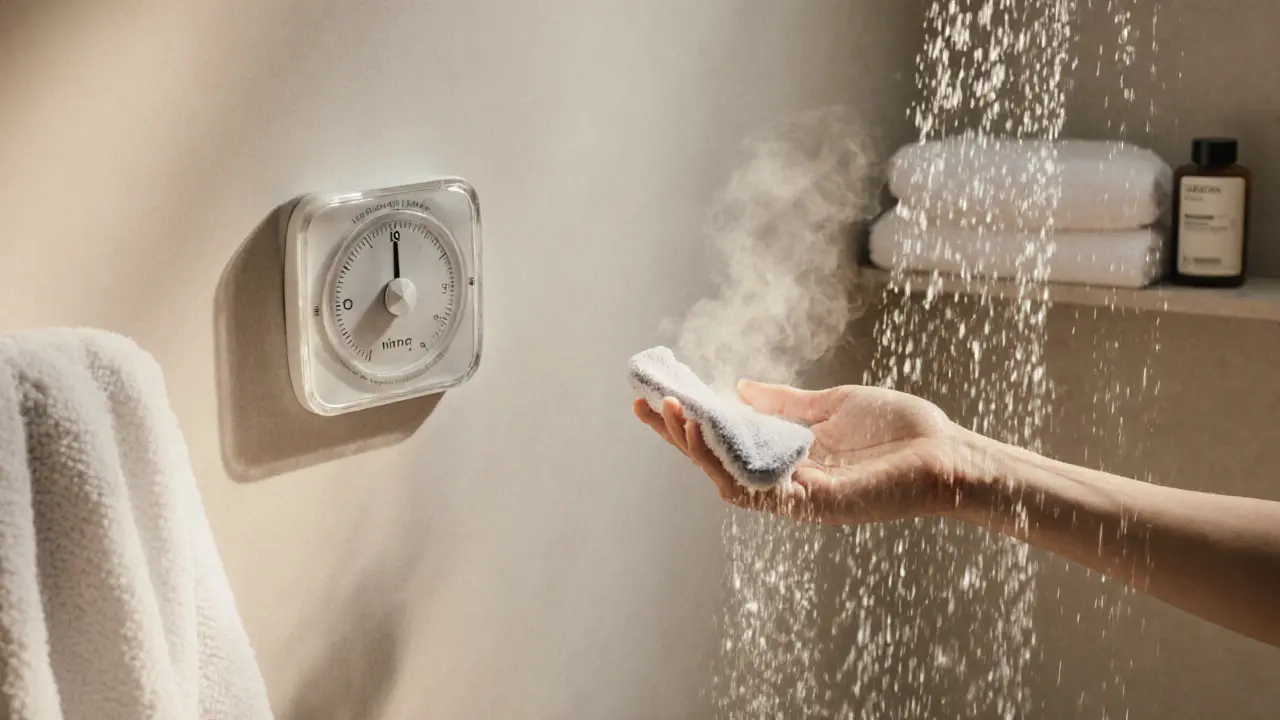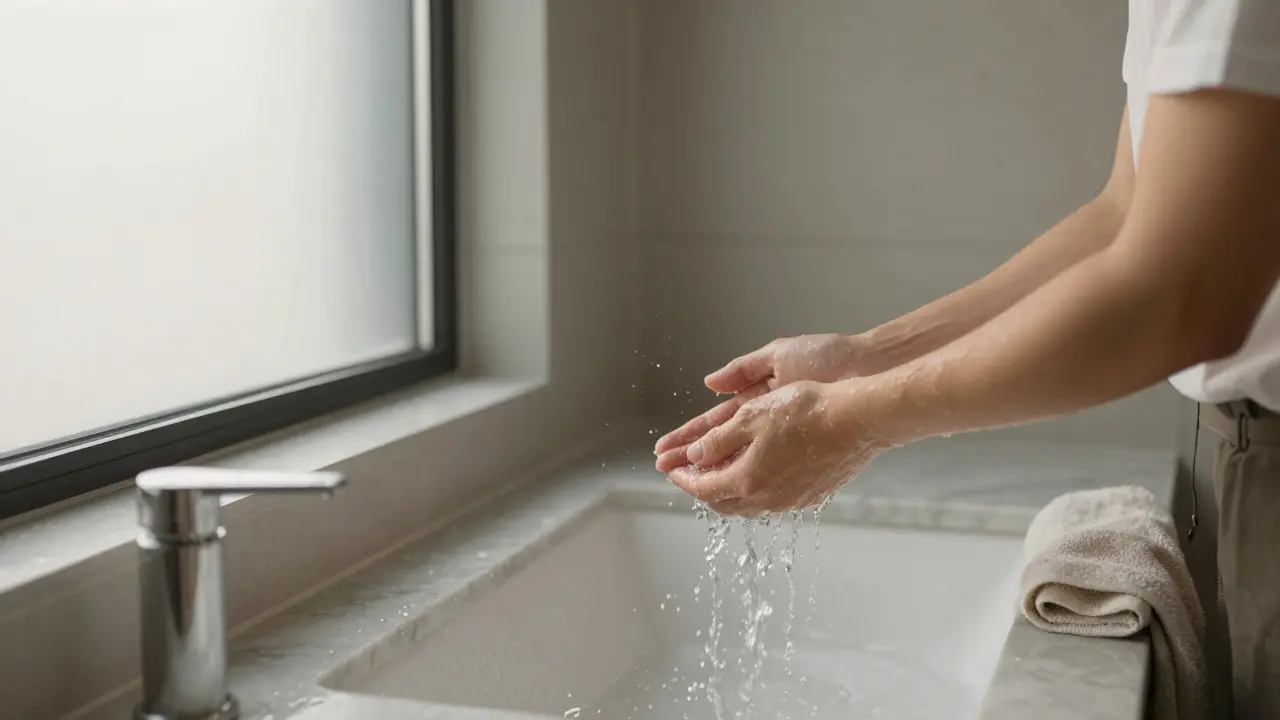When it comes to Showering is the act of cleaning the body with water and cleanser, most people wonder about the ideal showering frequency for healthy skin. The answer isn’t one‑size‑fits‑all; it hinges on your skin type, environment, and daily habits. Below you’ll find a practical, dermatologist‑backed roadmap that clears up the myths and gives you a clear game plan.
Understanding the Basics of Showering
Origins and History
Regular bathing dates back to ancient civilizations-Romans built public baths, while early Muslims emphasized "cleanliness is half of faith." Modern showers, invented in the 19th century, replaced communal tubs with a quick, water‑saving spray. The shift didn’t just save time; it changed how skin interacts with water and soap.
Core Principles or Components
Showering involves three core components: water temperature, cleanser type, and duration. Lukewarm water preserves the skin’s natural oil barrier, a gentle, pH‑balanced body wash avoids stripping, and keeping the rinse under 10 minutes helps prevent dehydration.
How It Differs from Related Practices
Unlike a full‑body soak, a shower delivers a steady flow that rinses away residue faster. Bathing can be therapeutic for sore muscles but often leaves skin sitting in water, which may lead to over‑hydration and a weakened barrier. Below is a quick comparison.
| Practice | Typical Duration | Impact on Skin |
|---|---|---|
| Shower | 5‑10 min | Maintains oil balance, quick rinse |
| Bath | 15‑30 min | Can over‑hydrate, possible barrier disruption |
Who Can Benefit from Optimized Showering?
Everyone-from teenage acne sufferers to seniors dealing with dry skin-can fine‑tune their routine. Athletes who sweat heavily may need multiple post‑workout showers, while office workers in climate‑controlled environments might thrive with a once‑daily rinse.
Benefits of Proper Showering for Skin Health
Maintaining the Skin Microbiome
A balanced skin microbiome protects against pathogens. Over‑washing with hot water can strip away good bacteria, leading to irritation. A dermatologist‑approved showering schedule-usually once a day with lukewarm water-keeps the microbiome stable while removing sweat and pollutants.
Regulating Sebum Production
When you strip skin of oil, sebaceous glands overcompensate, creating excess sebum that clogs pores. Moderate showering preserves natural sebum, helping acne‑prone individuals keep breakouts under control.
Preventing Dryness and Itchiness
Dry skin often results from harsh cleansers and long hot showers. Dermatologists recommend a gentle, fragrance‑free body wash followed by immediate moisturization to lock in moisture.
Practical Everyday Outcomes
Consistent, sensible showering leads to fewer rashes, less body odor, and better overall comfort. Below is a snapshot of the main advantages.
| Benefit | Description | Impact |
|---|---|---|
| Microbiome balance | Preserves good bacteria | Reduces infection risk |
| Oil regulation | Averts excess sebum | Fewer acne breakouts |
| Moisture retention | Prevents transepidermal water loss | Soft, supple skin |
| Odor control | Efficient sweat removal | Higher confidence |
What to Expect When Following Dermatologist Guidance
Setting or Context
Most recommendations assume a typical home bathroom with easy access to lukewarm water. In humid climates (like Dubai), you may want a ventilation fan to avoid excess humidity that can affect skin barrier.
Key Processes or Steps
- Adjust water to 90‑100 °F (32‑38 °C).
- Wet skin briefly, then apply a pea‑sized amount of gentle body wash.
- Massage in circular motions-focus on elbows, knees, and feet where skin is thicker.
- Rinse thoroughly within 8‑10 minutes.
- Pat dry with a soft towel; avoid vigorous rubbing.
- Apply a moisturizer within three minutes to seal in hydration.
Customization Options
People with eczema may benefit from oatmeal‑infused washes, while those with oily skin prefer a gel‑based cleanser. Some dermatologists suggest a “skin‑type day”-use a richer cream on dry days and a lighter lotion after workouts.
Communication and Preparation
If you’re seeing a dermatologist, note any recent changes-new detergents, climate shifts, or medication. Clear communication lets the doctor tailor frequency advice precisely for you.

How to Implement Dermatologist‑Recommended Showering
Setting Up for Success
Keep a waterproof timer in the shower to stay under 10 minutes. Stock a mild, fragrance‑free cleanser and a dermatologist‑approved moisturizer within arm’s reach.
Choosing the Right Tools
Look for body washes labeled “pH balanced (5.5)”, “sulfate‑free”, and “non‑comedogenic”. For hard‑water areas, a shower filter can reduce mineral buildup that aggravates dryness.
Step‑by‑Step Guide
- Turn on water and set temperature.
- Step in and quickly wet your body.
- Apply cleanser to a loofah or silicone brush-avoid abrasive scrub pads that can micro‑tear skin.
- Rinse completely, making sure no product residue remains.
- Dry by patting; then apply moisturizer.
- Finish with a quick air‑dry of hair if you prefer, to avoid extra heat.
Tips for Beginners or Couples
If you share a bathroom, coordinate timing to prevent rushed showers. For beginners, start with a 5‑minute routine and gradually increase to 8‑10 minutes as you get comfortable with the process.
Safety and Ethical Considerations
Choosing Qualified Practitioners
Verify that your skin professional holds a board‑certified dermatology license. In the UAE, look for a “Dubai Health Authority” registration number.
Safety Practices
| Practice | Purpose | Example |
|---|---|---|
| Use lukewarm water | Preserve barrier | 90‑100 °F |
| Limit duration | Prevent dehydration | ≤10 min |
| Choose gentle cleansers | Avoid irritants | Sulfate‑free, fragrance‑free |
| Moisturize promptly | Seal moisture | Apply within 3 min |
Setting Boundaries
Communicate any sensitivities-e.g., allergic to tea tree oil-before a dermatologist suggests a product. Boundaries keep you from trying “one‑size‑fits‑all” solutions that may backfire.
Contraindications or Risks
People with severe eczema, psoriasis flare‑ups, or open wounds should avoid hot showers and harsh soaps. In such cases, a dermatologist may recommend a brief, cool rinse and a medicated cream afterward.
Enhancing Your Shower Experience
Adding Complementary Practices
Follow your shower with a few minutes of gentle stretching or a short mindfulness breathing exercise. This pairs well with the calming effect of warm water and can improve circulation.
Collaborative or Solo Engagement
Some couples enjoy a “partner shower” where they help each other with exfoliation-just keep it gentle and use a shared, non‑comedogenic scrub.
Using Tools or Props
Silicone washcloths, handheld shower heads with adjustable spray, and water‑softening filters are inexpensive upgrades that can boost comfort and skin health.
Regular Engagement for Benefits
Consistency is key. Aim for a daily routine unless your skin type or climate suggests otherwise. Over time, you’ll notice smoother texture, fewer irritations, and a clearer complexion.

Finding Resources or Experts for Shower Guidance
Researching Qualified Experts
Check professional directories like the American Academy of Dermatology or the Emirates Dermatology Society. Look for reviews that mention skin‑type expertise, not just general satisfaction.
Online Guides and Communities
Websites such as Healthline, Mayo Clinic, and local UAE health forums often host dermatologist‑written articles on showering best practices. Forums let you ask specific questions and learn from real experiences.
Legal or Cultural Considerations
In the UAE, public bathing etiquette respects privacy; shared showers in gyms usually require a personal towel. Knowing these norms ensures you stay comfortable and respectful.
Resources for Continued Learning
Books like “The Skin Type Solution” by Dr. Li and video series from licensed dermatologists on YouTube can deepen your understanding. A subscription to a reputable skin‑care newsletter keeps you updated on new research.
FAQ: Common Questions About Shower Frequency
How often should I shower if I have normal skin?
For normal skin, most dermatologists suggest a once‑daily shower with lukewarm water and a mild cleanser. This balances cleanliness with barrier protection.
Can showering too often cause acne?
Yes. Over‑washing strips natural oils, prompting sebaceous glands to produce excess sebum, which can clog pores. If you’re acne‑prone, keep showers short, use a non‑comedogenic wash, and moisturize right after.
Is a cold shower better for my skin?
Cold water can reduce inflammation and tighten pores, but it may not clean sweat and oil effectively. A lukewarm shower strikes the best compromise-clean without shocking the skin barrier.
What’s the role of a shower filter?
Filters remove chlorine, heavy minerals, and other impurities that can dry out skin. In hard‑water regions like Dubai, a filter can noticeably improve skin softness and reduce soap scum.
Are there any skin conditions that need a special shower routine?
People with eczema or psoriasis often benefit from shorter, cooler showers and fragrance‑free cleansers. Adding colloidal oatmeal bath products can soothe flare‑ups, but always follow a dermatologist’s specific advice.
Conclusion: Why Tailoring Your Shower Routine Matters
By aligning your shower habits with dermatologist guidance, you protect the skin’s natural barrier, keep the microbiome happy, and reduce common annoyances like dryness or breakouts. The payoff is simple: healthier, more comfortable skin that looks and feels its best.
A Path to Better Skin
Consistent, thoughtful showering is a low‑cost, high‑impact habit-one that fits easily into any daily schedule.
Try It Mindfully
Start with the steps above, observe how your skin reacts, and adjust as needed. If you notice persistent irritation, schedule a brief consult with a board‑certified dermatologist.
Share Your Journey
Have you tried a dermatologist‑recommended routine? Drop a comment below, or follow the blog for more skin‑care tips.
Disclaimer: Some links may be affiliate links, but all recommendations are based on research and quality.




Dan Sprague
October 26, 2025 AT 15:39Great guide, gonna try the lukewarm showers asap!
Andrew Chen
November 25, 2025 AT 12:07Daily shower with moderate temperature is generally sufficient for most skin types.
Farrah Kennedy
December 25, 2025 AT 08:34Oh, because we all need a PhD in hydro-thermodynamics just to wash our backs, right?
The article actually nails the sweet spot between a sauna and a lukewarm drizzle.
It reminds us that water isn’t just for plants, it’s also a borderline‑toxic witch when it’s too hot.
I love how it warns about the catastrophic fallout of a 10‑minute hot tub session on your pores.
Your skin is not a sponge that needs to be saturated to the brim.
A quick rinse keeps the microbiome happy without turning you into a walking aquarium.
The tip about using a timer is pure gold; nobody wants to accidentally audition for a marathon.
If you’re in a hard‑water city, the filter suggestion is like giving your skin a tiny vacation.
And let’s not forget the moisturizer‑within‑three‑minutes rule – it’s basically a speed‑dating event for your skin.
Honestly, if you ignore this guide, you’re basically inviting eczema to move in rent‑free.
The tables comparing showers to baths are so clear that even my grandma could read them.
I also appreciate the nod to fragrance‑free cleansers because nobody enjoys smelling like a floral supermarket.
The article’s tone is semi‑clinical yet still manages to keep the sarcasm dialed to a subtle hum.
Bottom line: stick to lukewarm, keep it short, and moisturize like you’re trying to win a skin‑care award.
Follow that and you’ll be strutting out of the bathroom with confidence, not a desert of dead skin.
Alek Mercer
January 24, 2026 AT 05:02I commend the thoroughness of this guide; adopting a consistent, measured shower routine can significantly improve skin resilience and overall well‑being.
William Dean
February 23, 2026 AT 01:30Yeah, “significantly improve” sounds like a miracle cure, but let’s be real-most people just need a decent bar of soap and a reminder not to boil themselves.